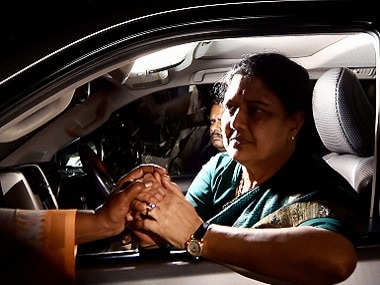The Supreme Court of India convicting AIADMK general secretary VK Sasikala in the disproportionate assets case on Tuesday was the biggest breaking news event of the year so far. And news outlets lapped up the event, giving it the coverage it deserved. One day after the verdict, newspapers went to town with their editorials and analysis pieces. [caption id=“attachment_3284568” align=“alignleft” width=“380”]  VK Sasikala is consoled by a lady on her way from to Poes Garden. PTI[/caption] Hindustan Times looked at the positives. “The Supreme Court verdict is good news on many counts. The most important is that it sends the message that the law will catch up with those who indulge in financial irregularities, no matter how powerful and politically well connected they are. On the political front, the verdict seals Sasikala’s electoral chances and with that her ambitions of becoming the chief minister of the state for the next 10 years.” An editorial in The Hindu, titled ‘The conviction and after’, spoke of the political ramifications for a person who was eyeing the chief minister’s chair. “Panneerselvam is nowhere close to splitting the AIADMK legislature party despite the support of the rank and file. Notwithstanding the legal setback, Ms. Sasikala may be able to trump Mr. Panneerselvam politically. But her success in keeping the MLAs together may depend on the Governor’s next move; whatever that is, Tamil Nadu is destined for more political churn. The Times of India spoke of the need for succession planning. In an editorial titled ‘Governor’s call’, it said, “The tussle in AIADMK foregrounds the lack of inner party democracy or succession planning among most Indian political parties unlike the UK where a prime minister can step down halfway through a term without triggering a succession crisis. The current crisis does provide the two dominant Dravidian parties of Tamil Nadu an opportunity to change their way of functioning as they are in the midst of a generational shift in leadership. Inner party democracy which includes a transparent structure for transitions will strengthen Indian democracy.” The Indian Express also spoke of the cloud of doom for Sasikala and her embattled AIADMK party, which finds itself with nobody at the helm. “The crisis in the AIADMK presents itself as an opportunity for the party to shed its inheritance of leader-centric politics for a leadership that is more plural and decentralised. The party’s founder, M.G. Ramachandran, and his successor, Jayalalithaa, built the party as an extension of their persona. They refused to groom a second line of leadership, which has contributed to the crisis the party has had to face after the death of MGR in 1987 and, Jayalalithaa in December last year,” it said. Deccan Chronicle published a scathing critique of Sasikala’s time. Titled ‘Tamil Nadu’s politics to see a tectonic shift’, the editorial, written by senior journalist R Mohan, said, “The actions of Sasikala as an extra constitutional authority whose links to the chief minister were so strong, save on a couple of occasions, that the state administration was virtually under her control as she was the deciding authority or the decisive influencing factor in all major appointments and transfers, be it IAS officers or policemen, were as reprehensible as her acquisitiveness of money and property. This was the saddest part of Tamil Nadu’s descent, particularly since Sasikala’s third innings at Poes Garden, that a state featuring extreme sycophancy should also become totally apathetic to public functions being hijacked in this manner.” The Telegraph also ran an editorial looking at the murky workings of the AIADMK, a party which still holds a majority in the Tamil Nadu state Assembly. “With the court verdict, the power struggle in the party has only got uglier and the path to political settlement even muddier. Sasikala, by appointing a proxy, has ensured that she remains in the game. As of now, E Palanisamy, the newly propped up legislature party leader, claims the support of a majority of AIADMK legislators. But the public goodwill clearly rests with O Panneerselvam, who does not have the numbers yet,” it said.
News outlets lapped up the news of the Supreme Court convicting AIADMK general secretary VK Sasikala in the disproportionate assets case on Tuesday, giving it the coverage it deserved
Advertisement
End of Article


)

)
)
)
)
)
)
)
)



